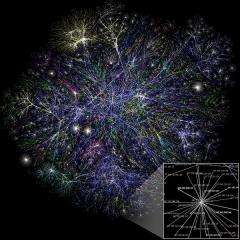June 18, 2012 report
Internet study links usage case with basket case

(Phys.org) -- You may have had to think about the Internet as a place where your Web usage puts a pricetag on your head and you are treated with ads assuming you are a likely customer. Now you need to think about the Internet as a place where your Web usage may land you on the books as mentally imbalanced. Sriram Chellappan and Raghavendra Kotikalapudi are two researchers who suggest the way one uses the Internet says something about the user’s mental well-being. Chellappan is an assistant professor of computer science at Missouri University of Science and Technology and Kotikalapudi is a computer science graduate.
They studied results from 216 undergraduates at Missouri S&T. The participants had to fill out a version of the Center for Epidemiologic Studies Depression Scale questionnaire, used for measuring depression levels in the general population. The survey revealed that 30 percent of the participants met the criteria for depressive symptoms.
This, said the authors, is in line with national estimates that 10 to 40 percent of college students at some point experience such symptoms.
The school’s IT department gave researchers campus data on campus Internet usage data for the participants—information about traffic flow that the university customarily collects for troubleshooting network connections.
The authors say that this is one of the study strengths. “Earlier studies have looked into the relationship between Internet usage and depression, but ours is thought to be the first to use actual Internet data, collected anonymously and unobtrusively, rather than student-completed surveys about Internet usage, which are less reliable.”
The researchers applied that data for a statistical analysis of the depression scores and Internet usage data. They said they found that students who showed signs of depression tended to use the Internet differently from those who showed no symptoms of depression.
Several telling signs of depression, according to the study, could be correlated to features of Internet usage, as “p2p packets, which indicate high levels of sharing files (like movies and music)." Another sign they claimed was a sign of depressive people was very high e-mail usage. They shared the view with some psychologists that frequent checking of e-mail may relate to high levels of anxiety, which they said correlates with depressive symptoms. The authors also called out high “flow duration entropy, ” which they said often occurs when there is frequent switching among Internet applications such as e-mail, chat rooms and games.
Other characteristic features of “depressive” Internet behavior, according to the study, included increased amounts of video watching, gaming and chatting.
The authors suggest practical applications of their research could be a software application for use on home computers and mobile devices. It would monitor Internet usage and alert the person when usage patterns may signal depression symptoms.
They also suggested the app as a tool for parents to monitor mood-related Internet usage patterns of their children. A third suggestion is that the app be used at universities to notify counselors of students whose Internet usage patterns indicate depressive behavior.
A paper describing the research, "Associating Depressive Symptoms in College Students with Internet Usage Using Real Internet Data," has been accepted for publication in a forthcoming issue of IEEE Technology and Society Magazine..
More information: web.mst.edu/~chellaps/papers/12_tech-soc_kcmwl.pdf
© 2012 Phys.Org
















